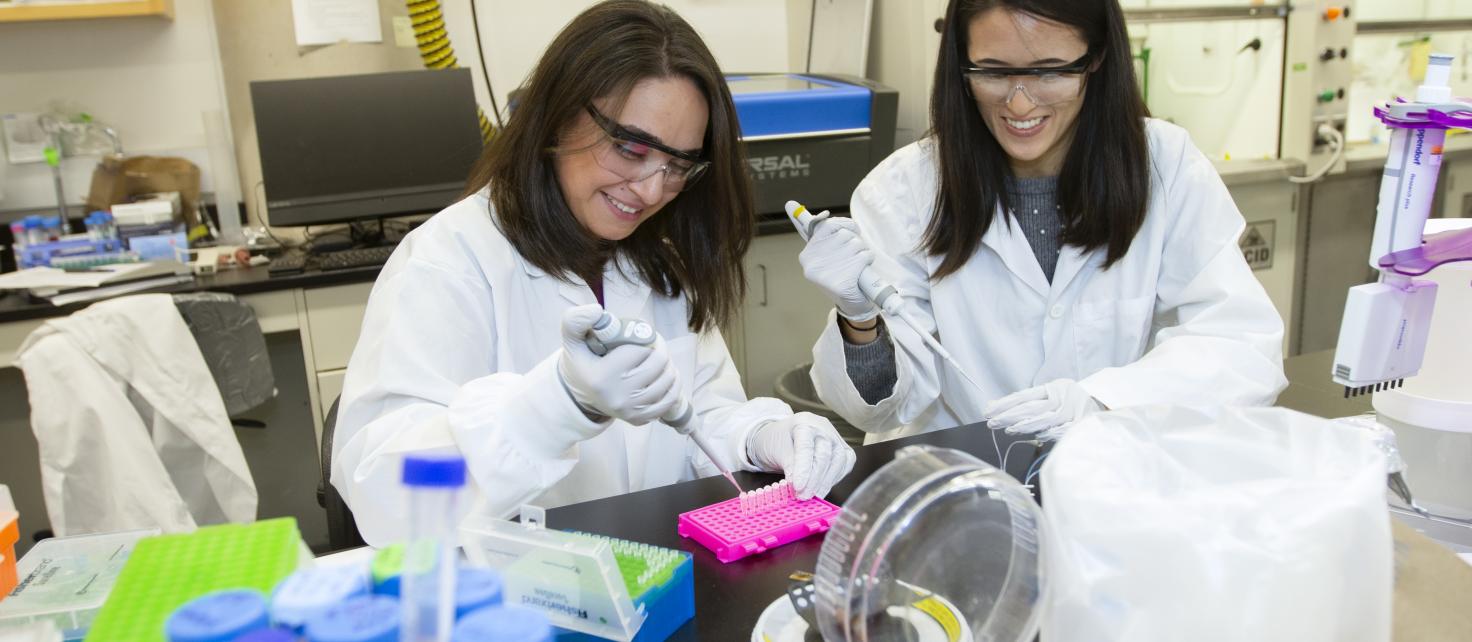Peivand Mousavi works alongside fellow PhD Candidate Jenise Chen on a collaborative project between the Pardee and Kelley labs.
What is your academic background and why is this area of research important?
I completed my undergraduate degree at the University of Waterloo in Honours Science with a Biology minor. I am currently a PhD candidate at the University of Toronto’s Leslie Dan Faculty of Pharmacy under the supervision of Dr. Keith Pardee.
Our lab focuses on synthetic biology and its applications in pharmaceutical sciences, including molecular diagnostics and drug manufacturing. The importance of this research is seen in exciting and practical applications to healthcare, one of which includes paper-based detection of infectious diseases such as Zika and Ebola.
What led you to your current Supervisor’s research group?
During my second year of undergraduate studies, I joined a student-led synthetic biology team at the University of Waterloo. Each year, the team works to design and build a research project to present at the International Genetically Engineered Machine (iGEM) competition. During this time, four interdisciplinary faculty advisors supported the team by bridging the fields of biology, engineering, and applied mathematics.
The collaborative nature and intersection of different disciplines sparked my interest in the field of synthetic biology. This shifted the course of my undergraduate experience as I decided to immerse myself in research by working part-time in the lab during study terms, taking on full-time research positions during the summers, taking on a lab leadership role within the 2015 Waterloo iGEM team, and completing a thesis project during my final year.
During this time and under supervision of Dr. Brian Ingalls I had the opportunity to attend the Synthetic Biology Summer School organized by the University of Toronto’s Impact Center. It was at this conference, that I met Keith who is now my supervisor. He gave a lecture and organized a lab activity based on his recent research on paper-based cell-free diagnostics. After seeing the application, innovation and global impact of Keith’s research, I knew that I would like to pursue my graduate studies in his lab.
What are some of the challenges you’ve had to overcome within your research?
When you are aiming to achieve something that has not been done before, you are bound to run into many challenges along the way. In a project recently published by Nature Chemistry , our team focused on interfacing the diagnostic technology from our lab with state-of-the-art nanofabricated electrochemical chips from Dr. Shana Kelley’s lab. Interfacing the two fields of synthetic biology and electrochemistry had its unique technical challenges that we overcame working closely with the Kelley team. This collaboration challenged me to communicate more effectively and learn new skills in areas outside of my field including nanofabrication and electrochemistry.
In addition, one of the foundational lessons I learned in graduate school and through my research is to persevere through failures and setbacks. For example, my project involved performance screening of 66 molecular parts in which only 10 succeeded. Instead of focusing on how many candidates failed during each iteration (and many failed!), I focused on designing my screening pipeline and experiments in a more strategic way.
Another major challenge I encountered was technical efficiency in my screenings. This led me to design a de novo assay inspired by literature and taught me the importance of pausing, exploring the literature, and taking a risk on something new that may prove to be beneficial in a long run.
How do you see your current research playing a role in your career?
My graduate research continues to help me build a strong set of technical and soft skills to apply in my future career. The multidisciplinary nature of my research has encouraged and challenged me to step out of my comfort zone by taking courses from different departments and training myself to ask the right questions in fields outside of my expertise. Through my current research, I have also developed a strong passion for mentoring others and gained confidence in managing research projects which I hope to pursue in the future as a career. I believe opportunities arise when you enjoy your current path so I am more focused on building up on my skills and enjoying my time at the Leslie Dan Faculty of Pharmacy.
What do you like to do when you are not working on research?
When I am not working on research, I enjoy thinking about community engagement and personal development. Over the past year, I volunteered at the U of T Parkdale Mentorship Program on weekends mentoring high school students in their career advancement. I also served as a Diversity and Inclusion Committee member at the iGEM international conference advocating and event planning to ensure accessibility and gender inclusivity in the iGEM scientific community.
I enjoy reading and taking part in the Women in STEAM book club organized by Dr. Christine Allen at the faculty. This book club has been a highlight in my graduate experience and provided an inviting space to learn and discuss topics like leadership and career development with other members of the faculty.
Outside of research and extracurricular groups, I try to keep a balanced life by staying physically active through yoga, finding artistic outlets like playing the Persian Setar, baking and spending time with family and friends.
More News
Image

Faces of PharmSci: Kinda Karra
MSc student Kinda Karra, working with Clinician Scientist Carlo DeAngelis, is studying why some breast cancer patients experience pain after chemotherapy and how a small blood sample could help detect signs of this reaction.
Read More
Image

Trade tariffs on pharmaceuticals ‘not the way to go’: U of T expert releases new study showing disruptions and cost increases
Trade tariffs on Canadian pharmaceuticals expected to increase costs in the U.S. and strain drug supply chains.
Read More
Image

Northern Ontario rotation inspires new perspective on pharmacy practice
Alina Montgomery’s rotation on Manitoulin Island demonstrated the importance of pharmacists in northern communities
Read More
